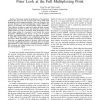Free Online Productivity Tools
i2Speak
i2Symbol
i2OCR
iTex2Img
iWeb2Print
iWeb2Shot
i2Type
iPdf2Split
iPdf2Merge
i2Bopomofo
i2Arabic
i2Style
i2Image
i2PDF
iLatex2Rtf
Sci2ools
111
click to vote
ICC
2008
IEEE
2008
IEEE
Analysis of Fixed Outage Transmission Schemes: A Finer Look at the Full Multiplexing Point
— This paper studies the performance of transmission schemes that have rate that increases with average SNR while maintaining a fixed outage probability. This is in contrast to the classical Zheng-Tse diversity-multiplexing tradeoff (DMT) that focuses on increasing rate and decreasing outage probability. Three different systems are explored: antenna diversity systems, time/frequency diversity systems, and automatic repeat request (ARQ) systems. In order to accurately study performance in the fixed outage setting, it is necessary to go beyond the coarse, asymptotic multiplexing gain metric. In the case of antenna diversity and time/frequency diversity, an affine approximation to high SNR outage capacity (i.e., multiplexing gain plus a power/rate offset) accurately describes performance and illustrates the very significant benefits of diversity. ARQ is also seen to provide a significant performance advantage, but even an affine approximation to outage capacity is sometimes unabl...
| Added | 30 May 2010 |
| Updated | 30 May 2010 |
| Type | Conference |
| Year | 2008 |
| Where | ICC |
| Authors | Peng Wu, Nihar Jindal |
Comments (0)

